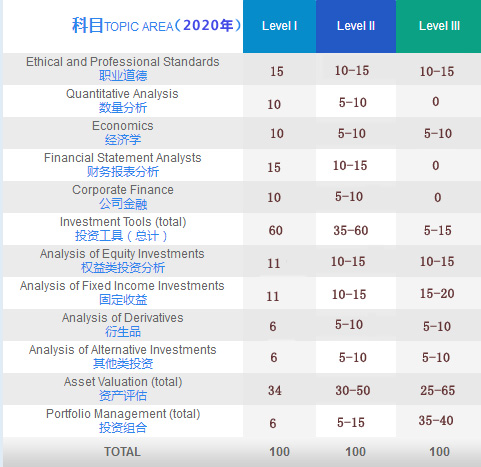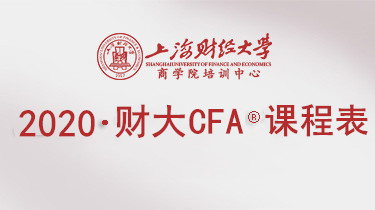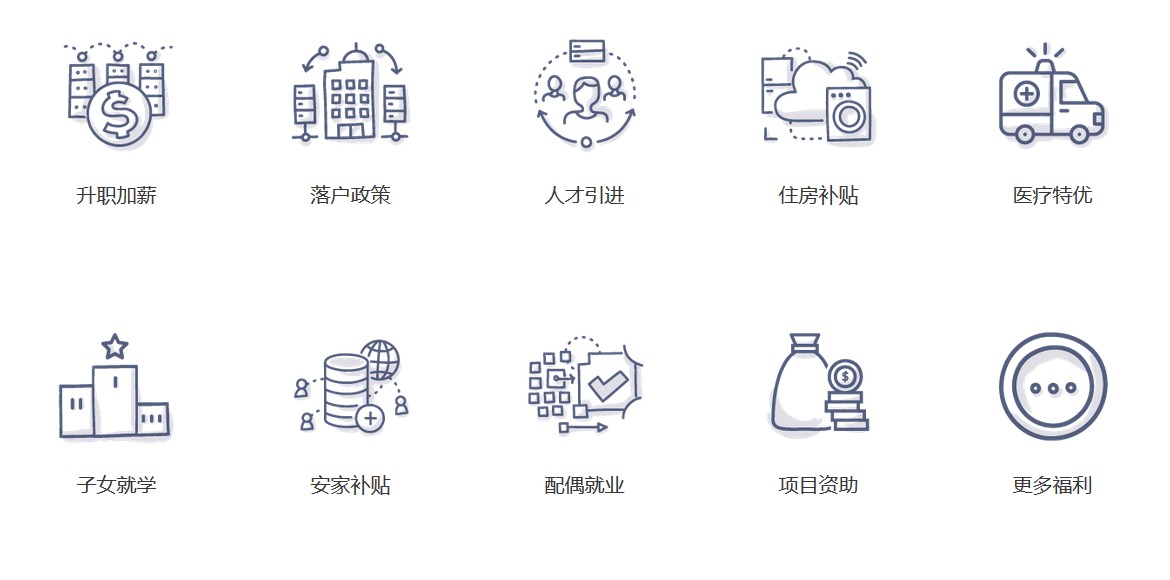2020年CFA考试科目介绍及各科权重占比,准备报考的同学一起来看看吧。
cfa一级考试一共有十个科目,涉及职业道德、数量分析、经济学、财务报表分析、公司金融、权益、固定收益、另类投资、衍生品、投资组合管理。
2020年CFA考试科目介绍及各科权重占比

Ethical and Professional Standards(职业道德)
This topic introduces ethics,related challenges to ethical behavior,and the role played by ethics and professionalism in the investment industry.A framework to support ethical decision making is provided to help guide behavior.CFA Institute Code of Ethics and Standards of Professional Conduct is examined,as well as the Global Investment Performance Standards(GIPS?).
翻译:本科目介绍道德,道德行为的相关挑战以及道德和专业精神在投资行业中扮演的角色。提供了支持道德决策的框架,以帮助指导行为。审查了CFA研究所的道德守则和专业行为标准以及全球投资绩效标准(GIPS?)。
Quantitative Methods(数量分析)
Introduces quantitative concepts and techniques used in financial analysis and investment decision making.Descriptive statistics used for conveying important data attributes such as central tendency,location,and dispersion are presented.Characteristics of return distributions are introduced.Probability theory and its application quantifying risk in investment decision making is considered.
翻译:介绍用于财务分析和投资决策的定量概念和技术。介绍了用于传达重要数据属性(如集中趋势,位置和离散度)的描述性统计信息。介绍了收益分配的特征。考虑了概率理论及其在投资决策中量化风险的应用。
Economics(经济学)
Introduces fundamental concepts of supply and demand analysis for individual consumers and firms.Also covered are the various market structures in which firms operate.Key macroeconomic concepts and principles are covered,including aggregate output and income measurement,aggregate demand and supply analysis,and analysis of economic growth factors.The topic concludes with coverage of the business cycle and its effect on economic activity.
翻译:介绍了个人消费者和公司的供需分析的基本概念。还涵盖了公司运作的各种市场结构。涵盖了关键的宏观经济概念和原则,包括总产出和收入计量,总需求和供给分析以及经济增长因素分析。本科目以商业周期及其对经济活动的影响作为结束。
Financial Report and Analysis(财务报表分析)
Offers a thorough explanation of financial reporting procedures and the standards that govern financial reporting disclosure.Emphasis is on basic financial statements and how alternative accounting methods affect those statement and the analysis of them.Primary financial statements are examined,along with a general framework for conducting financial statement analysis.
翻译:提供有关财务报告程序和管理财务报告披露的标准的详尽解释。重点是基本财务报表以及其他会计方法如何影响这些报表及其分析。审查了主要财务报表以及进行财务报表分析的一般框架。
Corporate Finance(公司金融)
Provides an introduction to corporate governance and investing and financing decisions.An overview of corporate governance is presented along with a framework for understanding and analyzing corporate governance and stakeholder management.The growing impact of environmental and social considerations in investing is also highlighted.Coverage is given on how companies make use of leverage and manage their working capital to meet short-term operational needs.
翻译:介绍公司治理以及投资和融资决策。提出了公司治理的概述以及用于理解和分析公司治理和利益相关者管理的框架。还强调了环境和社会因素对投资的日益增长的影响。涵盖了公司如何利用杠杆和管理其营运资金以满足短期运营需求的内容。
Equity Investments(权益)
Learn to describe characteristics of equity investments,security markets,and indexes.Analyze industries,companies and equity securities,and the use of basic equity valuation models.Global equities are defined as an important class for meeting longer-term growth and diversification objectives.
翻译:学习描述股票投资,证券市场和指数的特征。分析行业,公司和股票证券,以及基本股票估值模型的使用。全球股票被定义为满足长期增长和多元化目标的重要类别。
Fixed Income(固定收益)
Learn to describe fixed income securities and their markets,yield measures,risk factors,and valuation measurements and drivers.Calculating yields and values of fixed income securities will be covered.How to understand securitization of assets,the fundamentals of bond returns and risks,and basic principles of credit analysis are included.
翻译:学习描述固定收益证券及其市场,收益率度量,风险因素以及估值度量和驱动因素。将涵盖计算固定收益证券的收益率和价值。包括如何理解资产证券化,债券收益和风险的基本原理以及信用分析的基本原理。
Derivatives(衍生品)
Builds the conceptual framework for understanding the basic derivatives and derivative markets.Essential features and valuation concepts for forward commitments such as forwards,futures,and swaps and contingent claims are introduced.Arbitrage is discussed,a critical concept that link derivative pricing to the price of the underlying.
翻译:建立用于理解基本衍生产品和衍生产品市场的概念框架。介绍了远期承诺的基本功能和估值概念,例如远期,期货,掉期和或有债权。讨论了套利这一至关重要的概念,它将衍生产品定价与标的价格联系起来。
Alternative Investment Portfolio(另类投资)
There is discussion of alternative investments,including hedge funds,private equity,real estate,commodities,and infrastructure.The use of alternative investments for diversifications and higher returns is covered.The curriculum defines what alternative investments include,and the characteristics that they have in common.
翻译:关于替代投资的讨论,包括对冲基金,私募股权,房地产,大宗商品和基础设施。涵盖了使用另类投资来实现多元化和更高的回报。该课程定义了替代投资包括哪些内容,以及它们共有的特征。
Portfolio Management and Wealth Planning(投资组合管理和财富规划)
Explains and demonstrates the use of fundamentals of portfolio and risk management,including return and risk measurement,and portfolio planning and construction.The needs of both individual and institutional investors are examined,along with the range of available investment solutions.CAPM is used to identify optimal risk in portfolios.
翻译:解释并演示投资组合和风险管理基础知识的使用,包括收益和风险衡量以及投资组合计划和构建。考察了个人和机构投资者的需求,以及可用的投资解决方案的范围。CAPM用于确定投资组合中的******风险。
相关阅读:









